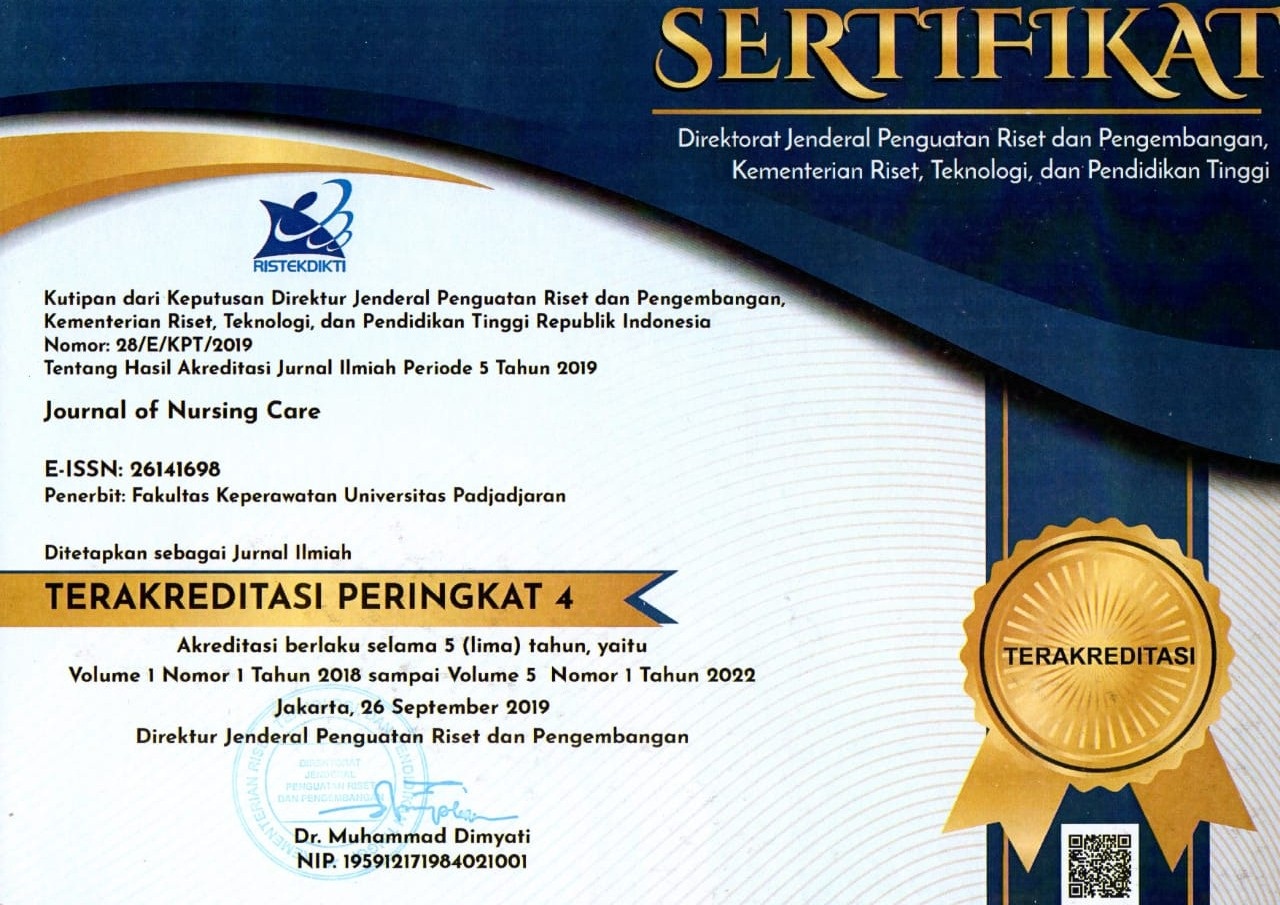Spiritual Needs of Patients with a Colostomy in a Public Hospital
Abstract
An intestinal stoma is an opening of the intestinal tract into the abdominal wall for patients with feces production problems. The process might change patients’ physical, psychological, social, and spiritual. Patients have limitations in daily activities, changes in elimination, depression, feeling hopeless, ashamed with the colostomy bag, and may also affect to their religious and spiritual. For example their religious rituals and belief in God. The aim of this study was to identify the spiritual need of patients with a colostomy in a public hospital in Bandung. This was a descriptive quantitative study, The population was patients with a colostomy who hospitalized in a public hospital in Bandung. The samples were chosen using the accidental sampling (n=42) technique. The study instrument was Spiritual Needs Questionaire (SpNQ), that consists of 19 questions with 4 dimensions (religious needs, inner peace, existential, and actively giving). Data were analyzed using statistics descriptive and presented in a table of distribution frequency. The study found that patients with a colostomy had the spiritual need for all dimension including the religious dimension (88,1%), inner peace (57,1%), existential (54,8%), and actively giving (52,4%). Patients with a permanent colostomy had higher scores on the spiritual needs than those temporary colostomy patients. It can be concluded that the religious dimension is the highest relevance of the spiritual needs. According to this study results, it is expected that nurses can improve the spiritual services in nursing care including assessing patients’ spiritual needs and facilitating patients to fulfill their spiritual needs. The facilitation includes providing an opportunity for praying together, spiritual books, helping patients for ritual worship, establishing therapeutic communication, giving patients their own time, and creating a quiet place.
Keywords
Full Text:
PDFReferences
Baldwin, C., Grant, M., Wendel, C., Rawl, S., Schmidt, C., & Ko, C. (2008). Influence of intestinal stoma on spiritual quality of life of U.S. veterans. J Holist Nurs, 20, 185-194. Doi:10.1177/0898010108315185.
Bastable, S. B. (2002). Perawat Sebagai Pendidik: Prinsip-prinsip Pengajaran & Pembelajaran. Jakarta: EGC.
Burch, J. (2013). Care of Patients with a Stoma. Nursing Standard/RNC Publishing, 27, 49-56.
Büssing, A., & Koenig, H. G. (2010). Spiritual Needs of Patients with Chronic Diseases. Religions, 1, 18-27. doi:10.3390/rel1010018
Büssing, A., Balzat, H. J., & Heusser, P. (2010). Spiritual Needs of Patients with Chronic Pain Disease and Cancer Validation of the Spiritual Needs Questionnaire. Europaean Journal of Medical Research, 266-273.
Darmanti, P. (2015). Gambaran Kebutuhan Psikososial dan Spiritual Pasien dengan Penyakit Kronis di Rumah Sakit Al-Islam Bandung. Universitas Padjadjaran.
Galus,Ben.S (2011). Budaya Baca Orang Indonesia Masih Rendah. From www.pendidikan.diy.go.id/dinas.v4/?view:v.artikel&id:8. Diakses 30 Agustus 2017.
Hamid, A. Y. (2008). Bunga Rampai Asuhan Keperawatan Kesehatan Jiwa. Jakarta: EGC.
Hawari, D. (2002). Dimensi Religi dalam Praktek Psikiatri dan Psikologi . Jakarta: FKUI.
Helen, & Putri, Y. S. (2014). Kualitas Hidup Pasien dengan Stoma Permanen di Rumah Sakit Kanker Dharmais. Fakultas Ilmu Keperawatan Universitas Indonesia.
Hidayat , A. A. (2006). Pengantar Kebutuhan Dasar Manusia: Aplikasi Konsep dan Proses Keperawatan. Jakarta: Salemba Medika.
Indonesian Ostomy Association. (2010). Informasi organisasi Indonesian ostomy association.from http://indonesianostomate.blogspot.co.id/. Diakses Desember, 27, 2016.
Johnson, M., Piderman, K., Sloan, J., Huschka, M., Atherton, P., & Hanson, J. (2007). Measuring spiritual quality of life in patients with cancer. Support Oncol, 5.
Khan, M. A., Jamal, S., Rashid, R., & Ahmad, N. (2011). Quality of Life Assessment in Patients with Stoma in Muslim Population. Ann. Pakistan Institute Medical Science. 7 (4) 222-227.
Kozier, Erb, Berman, & Snyder. (2010). Buku Ajar Fundamental Keperawatan: Konsep, Proses, dan Praktik (7 ed., Vol. 1). Jakarta: EGC.
Mauk, K. L., & Schmidt, N. K. (2004). Spiritual Care in Nursing Practice. USA: Lippincott & Wilkins.
Maruta, Hisayuki. (2003). Spiritual Pain and its Care in Patients with Terminal Cancer: Contruction of a Conceptual framework. Philosophical Approach Paliative Care, 1, 15-21
Nuraeni, A., Nurhidayah, I., Hidayati, N., Sari, C. W., & Mirwanti, R. (2015). Kebutuhan Spiritual pada Pasien Kanker. Jurnal Keperawatan Padjadjaran, 3, 57-61.
Rangki, L., Ibrahim, K., & Nuraeni, A. (2014). Pengalaman Hidup Pasien Stoma Pascakolostomi. Jurnal Keperawatan Padjadjaran, 2, 11-22.
Shenoy, K. R., & Nileshwar, A. (2014). Buku Ajar Ilmu Bedah (3 ed., Vol. 2). Tangerang: Karisma Publishung Group.
Smeltzer, S. C., & Bare, B. G. (2002). Buku Ajar Keperawatan Medikal Bedah . Jakarta: EGC.
Taha, N. F., & Moustafa, M. M. (2013). Hope Level and Life Satisfaction among Patients with Colostomy and their Family caregivers. Journal of Biology, Agriculture and Healthcare, 3(13).
Wachholtz, A., & Sambamoorthi, U. (2011). National Trends in Prayer Use as a Coping Mechanism for Health Concerns: Changes From 2002 to 2007.
Walton, J. (2002). Finding A Balance: A Grounded Theory Study of Spirituality in. Nephrology Nursing Journal, 29(5), 447–457.
World Health Organization. (2012). Colorectal cancer incidence, mortality and prevalence worldwide in 2008. From http://globocan.iarc.fr. Diakses 30 Oktober 2016.
Yosalina, Y. (2012). Gambaran Kebutuhan Spiritual pada Pasien Kanker Payudara di RS Hasan Sadikin Bandung. Universitas Padjadjaran.
Yulianti, T. (2016). Gambaran Kesejahteraan Spiritual Pasien dengan Stoma usus di RSUP DR. Hasan Sadikin Bandung. Universitas Padjadjaran.
DOI: https://doi.org/10.24198/jnc.v1i2.16520
Refbacks
- There are currently no refbacks.










Redaksi Journal of Nursing Care:
Fakultas Keperawatan, Universitas Padjadjaran
Jalan Raya Bandung-Sumedang Km. 21 Jatinangor, Sumedang, Indonesia 45363
WA: 085314295890
Tlp. 022-7795596
Email: jnc.fkep@unpad.ac.id

This work is licensed under a Creative Commons Attribution-NonCommercial 4.0 International License


